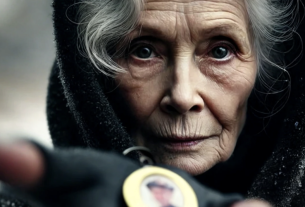Despite the formal abolition of estates, people are still divided into social categories. This is evident, for example, in the level of income: what is available to some remains an unattainable dream for others. The gap in wealth is sometimes so vast that ordinary citizens view their affluent compatriots as beings from another world—owners of luxurious mansions, premium cars, and guarded estates.
However, it is mistaken to assume that the life of the rich is endless bliss, full of joy and serenity. High-net-worth individuals have their own problems, and sometimes the scale of these issues corresponds to the magnitude of their fortunes. Big business owners literally lose themselves in work, solving one problem after another, devoting all their time to their “golden calf.” And sometimes they have to take risky steps just to stay afloat. Every such decision adds a gray hair and wears out nerves.
Roman Sergeyevich and Elena Nikolaevna Zuev were very well off. Their assets included several furniture manufacturing companies, a successful food business, and a construction company which, in fact, was only on paper under someone else’s name. Things were not just going well—they were thriving, allowing the family to achieve a multimillion-dollar fortune. But behind this picture of success lay many years of struggle, sacrifices, and hard work that had brought the couple to their current position. Roman and Elena had risen almost from the very bottom of society.
Once the situation stabilized, the main burden fell on Roman Sergeyevich’s shoulders. At 46, he practically lived at work, striving to create and solidify a business empire for his stepsons—Vanya and Seryozha. His motivation was ironclad: to leave a legacy for his children that they could manage jointly or individually. This goal pulled him out of bed every morning and forced him to spin like a hamster in a wheel late into the night.
Elena Nikolaevna played a secondary role in the business, but her contribution was no less important. She supported her husband in key areas and, thanks to her flexibility, sometimes managed to return home early to spend time with the children.
The Zuev business spanned a vast area of the city. The production workshops were located on the outskirts, and all documentation converged at one point—the company’s central office, situated in an old three-story building not far from the historic quarters. The building overlooked a picturesque river, bordered by a concrete channel.
There was so much going on that Roman Sergeyevich employed a large staff of office workers. The central office occupied all three floors of the building, including offices, conference rooms, modern kitchens, and even showers. Fresh snacks were always available in the kitchens—a bonus for the staff. The team was cohesive, responsive, and professional. Many employees had worked there for years and could not imagine themselves at another company. It was into such a friendly collective that a new technical worker, Evgenia, joined.
Evgenia was a native of a small village who had moved to the city at the age of 16. With only nine grades of school and a short vocational training course, she had managed to find her place in life. She had a son—a seven-year-old named Vova, the result of youthful infatuation followed by subsequent betrayal. The boy’s father disappeared barely after learning of the pregnancy, and law enforcement had been unsuccessfully trying to find him for child support for four years. Evgenia did not have illusions about these searches—most likely, they were just a formality.
Despite her difficulties, Evgenia remained a beautiful and energetic woman. Over the years in the big city she had worked in markets, stores, hospitals, and laundries. Everywhere she had proven herself to be a reliable and conscientious worker. However, monotony often forced her to change jobs in search of new opportunities.
When she landed a job as a cleaner at the Zuev office, she experienced true happiness. First, the workplace was close to the dormitory where she lived. Second, the team was friendly and did not shy away from interacting with technical staff. Third, the salary was decent, and the part-time work allowed her to spend more time with her son. Evgenia planned to stay in this position for another couple of years until Vova started school.
One August evening, as the air began to fill with the coolness of autumn, Roman Sergeyevich returned home in a gloomy mood. Elena immediately noticed his state. After dinner, the spouses asked the nanny to put the children to bed and secluded themselves in the study.
— What happened, dear? Elena asked, barely closing the door.
— They’re digging under us, Roman exhaled, sinking into his chair. — Today, an inspection hit the office. Serious men in plain clothes arrived and requested documents. They were particularly interested in the construction company, which we are supposedly only overseeing. But the worst part is that the head of the inspection is Klimov. Do you remember him? Now he’s gained power and clearly wants to take revenge for old grievances.
— What a bastard… We must urgently remove all compromising documentation!
— It’s too late, Lena. The inspection was sudden. There is an operative currently stationed in the office. My computer is under control. It’s impossible to remove anything. But there’s almost nothing there—just a couple of administrative fines.
— Almost nothing? So there is something after all? Documents regarding the construction company? Elena guessed.
— Yes, Roman nodded. — I know you told me not to get involved with this matter. But then Klimov demanded to be an unofficial co-manager of the company in exchange for the absence of inspections. I refused, and that cost us huge efforts to circumvent his demands.
Elena recalled that moment: the family’s long-time friend, Andrey Klimov, who had risen to the rank of captain in the law enforcement agencies, had shown up with a demand. He wanted a share of control over the construction company that the Zuevs had just begun developing. The scandal ended with Roman refusing to enter into such an arrangement, preferring to risk losing investments.
Now that choice was boomeranging back on them. Klimov was determined to destroy the Zuevs, and the family understood that the fight would be long and difficult.
The troubles only escalated from there. Fights, threats, long periods of indecision, and endless ordeals for the Zuevs culminated in a compromise: the construction company was opened, but it was registered under a third party—a front man.
Of course, the role of director was filled by a hired manager, completely dependent on Roman. However, tracking the financial flows that were diverted to special foreign accounts and returned as other transfers was incredibly difficult. Andrey Gennadievich Klimov, although not knowing all the details, understood perfectly well that his old friend had slipped from his control. And that “uncooperativeness” festered in his soul as deep resentment.
And as is well known, deep resentment can become a powerful driving force. When Klimov was promoted to colonel and took charge of a department, he began methodically digging into Roman’s affairs. Despite Roman’s seemingly impeccable legal standing, the colonel was convinced that somewhere there were clues.
And now it was clear that these clues had indeed been found. A judge had issued a search warrant.
— So answer me honestly: did you keep compromising information on your work computer? Elena’s eyes flared with anger mixed with anxiety.
— God forbid, my dear, Roman sighed heavily, feeling the ground slipping from beneath him. — But… there really are some data and reports in electronic format.
— And where are they? Could they be right next to the computer? Her voice trembled.
— Yes. In plain sight. As they say, if you want to hide something—put it in the most visible place.
Elena froze, then it dawned on her:
— That strange installation with the ancient disk and the singer’s autograph, enclosed in an acrylic box, which has been sitting on your desk for two years… Is that it?
— Exactly. That installation has a secret: when you press the hidden button, the disk ejects from the box and is used as intended. Then it returns to its place as if nothing happened.
— And how long were you planning to keep silent about this?
— You didn’t ask, Roman smiled nervously.
— Well… I take it you’re not going to rely on chance and have already thought of a way to discreetly remove that documentation?
— That’s right. Klimov isn’t a fool. He’s known my habits since school. No one would suspect, but he might. Therefore, we must act. I have a plan…
The next morning, Elena, with her two sons in tow, entered the study, causing the dozing operative to startle awake.
— No entry here! grumbled the employee, clearly tired of his role as “guard.”
— Sorry! I didn’t know you were still here. Children, we need to leave!
But the boys, seizing the moment, broke free from their mother’s grasp and ran across the study, chattering happily.
— Vanya, Seryozha! Their mother dramatically chided them, playing her role. — Stop behaving like that. Uncle is not your father’s subordinate. He’s in charge here now.
— In charge? asked the eldest, Vanya, holding the installation with the disk. — Why?
— Because he needs to check on some things. Let’s go. Others will arrive here soon. And we’ll come back later.
Elena left the study with her sons. Along with them, in Ivan’s hands, an important item—the glass box with the signed disk—was on its way.
On the first floor, Elena crossed paths with Klimov. The former “friends” silently measured each other with disdainful looks. The colonel did not bother to get entangled with the spouse of his opponent, and together with his colleagues, he headed to the upper floor.
After listening sullenly to a subordinate’s report that nothing had happened, Klimov exploded:
— I said: no one was supposed to enter this study until my arrival! What did she take out?
— N-nothing, comrade colonel, mumbled the operative, flustered. — Only the children ran around. The visit lasted a couple of minutes, nothing more!
— Wait… Something is missing here! Klimov inspected the study closely, comparing it with the mental image he had stored in his memory.
Not finding anything suspicious, he took a camera from his subordinate and quickly began reviewing yesterday’s photos, comparing them with the current state of the room. After a few minutes, he realized what was missing.
“What a trickster,” he thought. “As always, everything important is right in front of us. Clever and elusive. But I too will rise.”
— Is the Zuev’s car still in the parking lot? he asked, handing the camera back.
— Yes.
— Detain the car and search it. We need that disk. This one, — he showed a photograph.
— Got it!
Two employees dashed off to carry out the order. Elena’s car had already left when the police stopped it. After a brief conversation, she handed over the keys with dignity.
— And me? Must I stay? I urgently need to leave with the children.
— No, you are not under arrest, Elena Nikolaevna, one of the policemen replied, clearly not enthusiastic about enforcing such orders. — But the car stays here.
— Fine. I’ll take a taxi. Or… she noticed a bus at the stop. — …I’ll use public transport. I’ve long promised the children a bus ride. Goodbye!
Evgenia, boarding the bus, was surprised to see Elena with the children. She took a seat in the back row, where the director’s wife soon relocated.
Usually, Evgenia walked home, but today she allowed herself the luxury of a bus ride. In the back seat, Elena pulled out that very installation from her jacket, twirled it in her hands, and tucked something into her purse. These movements did not escape Evgenia’s peripheral vision, who, unwittingly, began to feel nervous.
For the rest of the journey, she remained silent, pondering what had led the rich man’s wife to use public transport. But her surprise increased when, at one of the stops, a black car cut the bus off, and plainclothes men asked Elena and the children to get off.
With dignity, the rich man’s wife agreed, grabbed her purse, and left the bus under the astonished gazes of the passengers. The bus continued its route, and the driver grumbled for a while about those who “bought their licenses.”
When Evgenia got off at her stop, she was horrified to discover that, apparently in haste, the mistress had mixed up her purse. Instead of her simple and familiar bag, she was holding a luxurious white leather clutch with the logo of a well-known brand.
— Are you even leaving, or are you just standing there blocking the aisle? the driver grumbled irritably.
— Yes, yes, I’m leaving, sorry, Evgenia answered hastily and left the bus, intending to call the office and report the mix-up.
At home, after seating her son for dinner, she decided to call a neighbor who still had a landline. Upon returning, she was stunned: little Vova, driven by curiosity, had taken the disk out of the purse and was now examining it from all sides.
— Mom, what’s this? asked Vova, who had grown up in an era when disks had long ceased to be relevant.
— Vova! Did I ever allow you to rummage in the purse? Evgenia asked sharply, though inwardly she understood that the situation had spiraled out of control.
— I was looking for some gum, the boy frowned. — Didn’t you let me before? Then I became curious about this tiny disk. I’ve never seen one like it. What is it for?
— It doesn’t matter, son! Besides, it’s not my purse!
— And how was I to know? retorted Vova, clearly pleased with his logic.
— And why did you stick your hand in the wallet?
— Because the wallet looks like a second purse! A purse inside a purse! the boy insisted, convinced he was right.
Evgenia sighed, realizing that arguing was futile. She carefully took the disk and looked closely at the signature:
— Oh! I used to listen to it as a child, she recognized the autograph of a famous singer. — It must be a valuable piece, since Elena Nikolaevna is keeping it in her wallet. But all of this is very strange… The bus, plainclothes people, this purse, and the disk…
Gradually, the events of the past days and hours began to form one logical hypothesis in her mind: the purses had been intentionally switched. The head of the firm was apparently hoping that those watching her wouldn’t notice the swap, and decided to take advantage of Evgenia’s inattention by leaving someone else’s purse nearby.
But that hypothesis needed to be verified before jumping to conclusions. Fortunately, her old laptop still had a working disc drive, which, despite its years of service, continued to function flawlessly. To confirm her suspicions, she started the device, opened the tray, and carefully inserted the small disk into the slot. Then she froze, waiting for the results to appear on the screen.
The old machine buzzed and whirred, as if awakening from a long slumber. And soon, instead of the expected list of tracks by the famous performer, a complex system of documents and records appeared on the screen—documents that clearly held enormous significance for the Zuev family.
Just then, there was a knock at the door, and Evgenia slammed the laptop shut in fear. She did not want to open the door for strangers. However, when one of the guests showed his ID through the peephole, there was no choice.
— Evgenia Alexandrovna, one of them said calmly, — you recently called the office’s landline and informed a colleague that you have Elena Nikolaevna’s purse. Is that so?
— Yes, Evgenia replied, trying to keep her composure despite the inner fear.
— Did you open the purse?
At that moment, it felt to Evgenia as if her thoughts and feelings were completely transparent. In a second, dozens of doubts and fears flashed by. But, weighing everything, she decided that she did not wish any harm upon the Zuev family. It was obvious that, under the guise of law enforcement officers, someone was actively “digging” to find compromising material. However, despite the fact that she only knew the firm’s owners from afar—according to her colleagues, Roman Sergeyevich and Elena Nikolaevna were not the type to commit deliberate treachery or crimes—in such a difficult time, when “werewolves in uniforms” could be lurking behind the authorities, she decided to do her duty as a loyal employee to the end. Therefore, she told only part of the truth:
— My son took out the purse while he was looking for gum. But he didn’t touch anything.
— Very well. May I have that purse?
— Of course, Evgenia replied, extending the accessory. The small room was so cramped that she did not even have to move far from the door. — Here it is.
— Thank you. We will return it to its owner safely.
— I have no doubt, Evgenia nodded, although inside she was gripped by anxiety.
As soon as the visitors left, she rushed back to the laptop. The device, as if in defiance, took a long time to boot up. When the system finally allowed the disk to be read, the woman exhaled in relief. After that, she turned to her son:
— Vova, get ready!
— Where are we going, Mom?
— Out of town. We need to meet with some very important people…
The disk almost slipped from Andrey Gennadievich’s hands right on the bus. This immensely irritated the colonel, who had put everything on the line for this operation: his position, his reputation, and even his epaulettes.
Long-standing resentment—that was what drove Klimov forward. That feeling, like a poisonous thorn, had taken root in his soul many years ago and never let go.
The colonel had never aspired to work in law enforcement. His father, an old career officer in the security services, had forcibly pushed him into a cadet school and later into a special school to train future officers. All these years, Andrey had watched as his classmate Roma Zuev chose a completely different path—the path of freedom and independence. It was he who founded his first business, which grew faster than anyone could have imagined.
That could still be tolerated. But the most painful thing was that both friends had fallen in love with the same girl—Lena, a beautiful gymnast and champion of local competitions. Although Andrey seemed more promising and confident, fate decided otherwise. Lena chose Roma.
For many years, Klimov waited, nursing plans of revenge. Either he wanted a share of his former friend’s wealth or a blow to his family’s well-being. He could not forget the childhood grievances that now demanded retribution.
“I offered you a partnership, to give me a stake in the construction company. But no—you were always too proud,” Klimov thought bitterly as he sat in Roman’s chair, gazing at a family portrait on the wall. “Well, now you will lose everything. You’ll see.”
At that moment, the door opened, and subordinates entered the study, having completed their task. They returned with the purse, which, according to them, they had found at the dormitory. Andrey Gennadievich was pleased: the call from the responsible cleaner had confirmed his suspicion that the purses had been deliberately swapped. However, inside the accessory was only the installation with the box, without the most important element.
— That’s it, Andrey Gennadievich, the task is done, the operative dumped the contents of the purse onto the table.
Klimov carefully inspected the items, checked the wallet, and, not finding what he needed, muttered through his teeth:
— Search the dorm room and bring the cleaner to me. Hurry!
— But that’s illegal, noted a subordinate.
— That is my responsibility, the colonel grumbled, once again feeling how the necessary item slipped from his grasp…
The Zuev spouses, still recovering from the day’s shocks, sat at home trying to regain their composure. They realized that they were hanging by a thread. The current whereabouts of the disk remained unknown. Their only hope was that the operatives had not identified the cleaner.
— We’ll hold on until tomorrow—everything will pass. I have already contacted the private security service. They are interested in Klimov’s excessive activities, Roman said.
— What a sneaky bastard! Elena cursed once again, picking up the phone from one of the staff members.
After listening to the confused report, she paled.
— What happened? Roman asked, tensing up.
— They found the purse, she exhaled. — Your secretary discovered it on the table in the study when everyone had left the building.
— So, they got hold of the documentation… That’s it, Roman lowered his head.
At that moment, as despair completely overtook the Zuev clan, the housekeeper softly knocked on the door.
— Roman Sergeyevich, Elena Nikolaevna, a strange woman with a child has come to see you. She claims that she works for you as a cleaner and brought something important.
Elena stiffened.
— Don’t let her in. Tell her to go to the pond, to the wharf. I will be there in an hour.
The housekeeper went out to relay the message.
— That’s all. We’ve won, Elena approached her husband and embraced him reassuringly.
— Why are you so sure? Roman asked.
— If Klimov had found the disk, we wouldn’t be here now. But we must be careful. I’m sure our house is being watched. We mustn’t expose ourselves at the very end…
At the appointed time, Elena met Evgenia by the water. The cleaner had prudently hidden the disk in a waterproof bag and left it nearby the meeting point.
The next morning, the private security service began a new check regarding Klimov, who had clearly exceeded his authority. Roman actively participated in the investigation, and within a couple of months he happily informed his wife that the colonel had been temporarily removed from service, and the possibility of launching a criminal case was under serious consideration.
After that event, the construction company’s operations were legalized. The transfer of rights from one owner to another went smoothly, but the situation became an important lesson for the Zuev family: to conduct business only transparently, without gray schemes or legal manipulations.
Evgenia’s contribution was not forgotten. The young woman was given the position of personal assistant and sent for further training. A plan was made for her: college, then an institute—all at the firm’s expense.
Thanks to the dedication of the young employee, the Zuev family maintained its position. In gratitude, they purchased a plot of land near their home and began constructing a small but cozy house for Evgenia.
The disk, cleansed of all data after the legalization, found its place on a pedestal. Roman personally broke the mechanism so that it could never be extracted again. Now it became a family relic, a reminder of the crisis, of an envious friend, and of good people ready to help even those they had only recently come to know.



